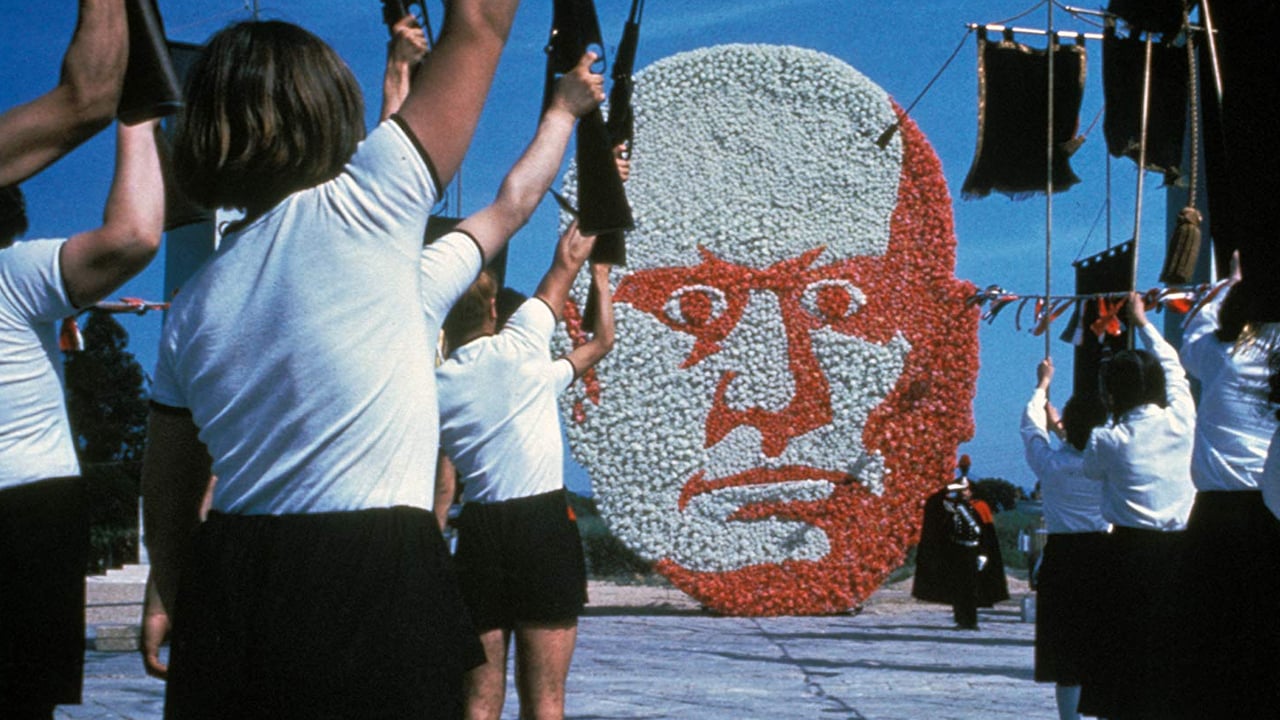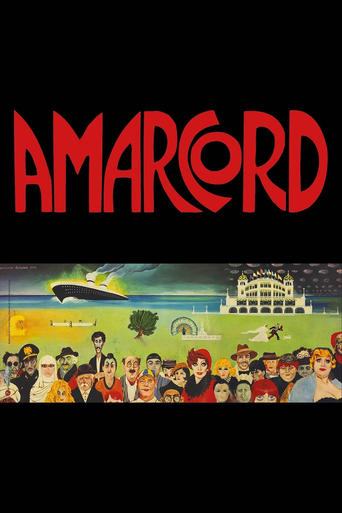

Fellini gives us a series of memories, fantasies, and dreams in the vignettes which make up his semi-autobiographical film 'Amarcord' ('I Remember'). The message which comes through is loving, and about the gaiety of life, embracing its madcap characters and moments - moments which will someday live in our memories, hazy though they grow, as little diamonds of light. I loved the scenes satirizing the Fascists and the Catholic Church, and they're all the more powerful in this context, where they are reduced in significance, and just another zany thing Italians dealt with (or deal with) in life. The film doesn't strike any major philosophical chords, briefly coming close as men peer up into the heavens, but the lines uttered as a poem by a construction worker are powerful ("My grandfather made bricks / My father made bricks / I make bricks, too / but where's my house?"). I may be in the minority here, but the film didn't strike me as particularly beautiful, though it was a pleasure to see Magali Noël (Rififi, La Dolce Vita, and many others). It held my interest, but lacked a big punch, even in its sentimentality, though I was always pulling for it, and loved the many references to Hollywood actors from the 1930's. Unfortunately, there is not enough depth here to consider it a great film, and Fellini too often indulged in caricatures and juvenile humor. Net, a mixed bag.
... View MoreA series of comedic and nostalgic vignettes set in a 1930s Italian coastal town.Vincent Canby lauded it as possibly "Fellini's most marvelous film... an extravagantly funny, sometimes dreamlike evocation of a year in the life of a small Italian coastal town in the 1930s, not as it literally was, but as it is recalled by a director with access to the resources of the Italian film industry and a piper's command over our imaginations. When Fellini is working in peak condition, as he is in Amarcord, he somehow brings out the best in us. We become more humane, less stuffy, more appreciative of the profound importance of attitudes that in other circumstances would seem merely eccentric if not lunatic." Canby is spot on. Although I have not seen everything Fellini has done, this film jumps out for me as his best work. The giant Mussolini head, the blend of comedy and tragedy... it is just so full of moving imagery. I would be shocked if any of his films surpassed this level of brilliance.
... View MoreDepicting what happens in an Italian little village in the middle 30's, Federico Fellini's AMARCORD is, at the same time, a sweet remembrance and a sarcastic and humorous satire. In fact this film describes very well the desires and irreverence of the youth (and probably here Fellini is depicting himself, when he was a young teenager) but it also portrays some social problems, the raise of Fascism in Italy and the difficulties of dysfunctional families. All of this with intense sarcasm and hilarious moments! The flatulence scenes for instance, can be disgusting to some, but I found them funny! I think there isn't a real main character in this film, because there're a few important to the plot. Of course the entire plot circles around TITTA (Bruno Zanin), but characters like MIRANDA or AURELIO, his parents, or even GRADISCA, his muse, are very important as well.Here Fellini does a film which is pure, intense, sarcastic, at parts grotesque, but essentially humorous and real! I score it 8/10!
... View MoreA creation can be specifically located in time and space but carrying timeless and universal significances, that's the mark of the greatest artists. Fellini –again- accomplishes this compromise in "Amarcord" with an incomparable virtuosity.All Fellini's films, encapsulate a part of Italy's heritage and/or population but "Amarcord" is probably the most explicitly autobiographical. Reassembling through a succession of little vignettes his youth memories in a small town named Borga, Fellini paints the flamboyant portrait of colorful and eccentric characters, so different yet so united that the town feels like a character. From Burcin, the compulsive liar street-vendor to Volpina, the blonde nymphomaniac, from an irascible blind accordionist to a tobacconist with giant breasts or the charming lawyer who pops up every once in a while to speak about the town's history, they all stick in our memories, even more because we all knew one of them in our youth.The most emblematic figure remains Gradisca, the local beauty played by Magali Noel, she was Fanny the nightclub dancer in "La Dolce Vita". The 'Lady in Red' is one of these immortal representations of Fellini's filmography along with Cabiria, Guido or Gelsomina, always parading in town swinging a beautiful derrière that invites for the most luscious fantasies. She's a living fantasy herself, coveted by men, envied by women; she's one of these privileged persons so beautiful that she can allow herself to be tempting. She also symbolizes the eternal interference of lust, sexual fantasy and boy's memories. "Amarcord" is a man's film but of a man exploring his inner adolescent, through Titta's character. Indeed, in boys' memories, sex takes a significant place. In a hilarious scene, that I could relate to as a guy who grew up in a conservative Mediterranean society, the religious instructor, a nerdy looking guy with huge glasses warns Titta about masturbation, an act that makes "Saint Louis cry". Titta delivers an interior monologue taking us a witness: how can he avoid touching himself with all the temptations surrounding him? Gradisca, Volpina, the fat- bottomed peasant women in their bicycles, the fat tobacconist? Titta crystallizes in one monologue all the frustrations of a generation lost between forbiddings and temptations. To a certain extent, Titta also embodies Italy's condition."Amarcord" is a rich film providing many layers of appreciation, but beyond the cheerful tone of the film, there's the commentary on the way Italy was conditioned by the grotesque Mussolini, and Church's omnipresence. In another memorable scene of the film, the fat boy pictures the huge statue of Mussolini's head marrying him to the beautiful brunette, Aldina. Submitted to authorities, little people were maintained in a sort of childhood condition that might explain their everyday insouciance. It's sad to see Gradisca hailing the Duce, unaware of the chaos he'll bring Italy to, and even sadder to see Aurelio, Titta's father, a brave communist working-man being harassed by the fascist police.Titta's family is another remarkable example of Fellini's capability to create characters that rapidly grow in our hearts, delirious and poignant in the same time, like so many clowns of life's circus act. After an argument with his wife Miranda, both threaten to 'kill themselves'. Anyone, who'd find that Fellini goes over the top, must consider the Family background in "Amarcord", when adults were no better than children. How can you also resist to the dim-witted uncle who climbs a tree and shouts, "I want a woman!" or when all the townspeople embark in small boats just to admire the SS Rex, the regime's greatest technological achievement. With Chaplin, Fellini is probably the only film artist who makes pathos so endearing."Amacord", echoes the self-referential aspect of "8½" and has the realism of his earlier work. As a great mix of nostalgic fantasy and realistic social commentary, "Amarcord" is one of his best works, precisely because it's the most accessible in both sides of his talent. "Amarcord" immediately mesmerized me. I could immediately relate to Titta, to the boys, we all had fantasies on women that fulfilled our noisiest nights, I can't count how many house maids made my nights, or how many teachers inspired me the most lustful thoughts. And still, it's a Fellini's film with its share of music, the nostalgia inducing tone of Nino Rota, parades and processions.And like many coming-of-age stories, the film follows a clear cycle, one year, starting with the arrival of puffballs floating in the air, announcing the spring. Whether it's by snow or fog, it's a time when people are still easily distracted. A snow fight is brutally interrupted by a piercing peacock's sound, only to see feathers floating in the air, a simple, magical and fascinating moment. I guess at the time the film was made, no one would care, radio, TV would prevent people from playing games, having parties, spending times together. Now, it's even worse, how can you even allow fantasizing at the pinnacle of the porn industry or when any girl can post her pictures in Facebook. Sex has been so trivialized that even the scene where Titta literally suffocates in the tobacconist's breast is more innocent than any clip from today's television.Indeed, "Amarcord" is the eulogy of a lost innocence, it ends with these Felliniesque parties where Gradisca leaves the town, after having found the love of her life, but somewhat, as the beaches gets empty, I was sad to see these people I shared this two-hour slice of lives leaving the screen. "Amarcord" inspired one of my favorite Woody Allen's films, "Radio Days". I, of course, wish I had seen it first. But nonetheless, I'm going to give it the same compliment, "it made me feel nostalgic for an era I didn't live." And that's because it was indirectly reflecting my own memories and an innocence that I'd mourn and celebrate forever, with this mix of happiness of poignancy in the universal music of life that only Fellini can orchestrate.
... View More